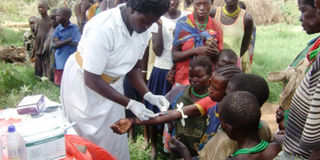Speaker recalls HIV Bill, more Shs40b for census

A health worker draws blood from a Karimojong woman during a free HIV testing drive in Karamoja last year. The Deputy Speaker of Parliament, Mr Jacob Oulanyah, has recalled a Bill aimed at criminalising the intentional spread of HIV/Aids. File photo
What you need to know:
Deputy Speaker of Parliament says the HIV Bill tabled in 2010 needs further deliberations.
The House was a beehive of activity with the Deputy Speaker, Mr Jacob Oulanyah, recalling the HIV/Aids Prevention and Control Bill, to subject it to further scrutiny. The Bill, among others, seeks to criminalise the intentional spread of HIV/Aids.
The Bill, a private members’ initiative, was tabled before Parliament by legislators on the Parliamentary HIV/Aids Committee during the 8th Parliament in 2010.
But for the last two weeks, the Bill has remained on the list of Parliament’s urgent business to be debated but it was deferred several times until it was withdrawn following a spate of criticism.
The Bill carries clauses that seek to criminalise intentional spread of the disease, but also compel couples to mandatorily test for HIV/Aids. Article 41 of the Bill says a person who knowingly transmits HIV to another person shall be prosecuted [up to 10 years in jail upon conviction].
Criminalising the intentional spread of HIV/Aids, is on the whole a positive step in the right direction and majority MPs are in support of the Bill. But they want a better legislation on the subject.
Human rights and health rights activists have opposed Article 41 of the Bill, saying it threatens progress the country has made in managing and controlling the disease. They also maintain that the clause will prevent people from testing voluntarily for HIV for fear of reprimand.
The Ministry of Health officials from the Uganda Aids Commission, while appearing before the HIV/Aids committee last week, too opposed Article 41, saying the clause denies people the opportunity of being in charge of their health.
Scientists from the Uganda Virus Research Institute warned on the likely grave consequences that may arise from passing of the HIV/Aids Bill with a clause that seeks to criminalise intentional transmission of HIV.
Rubaga Municipality
The Leader of Government Business announced that the government is in the final stages of tabling before Parliament a new law that will create Rubaga Municipality [although it had earlier on committed itself to the creation of Mengo Municipality] and further delineate disputed boundaries of Kampala City.
Prime Minister Amama Mbabazi on Wednesday said they agreed with Mengo “that we would create a new municipality of Rubaga and the creation of Rubaga Municipality would curve parts of Kampala Central into Rubaga” to enable government manage greater Kampala.
Although Mr Mbabazi talked of Rubaga Municipality, there was Mengo Municipality initially managed separately from Kampala Municipality in the Independence Constitution. It was later in 1968 merged with Kampala City through a statutory instrument but many parts remained peri-urban and unplanned.
If passed by Parliament, the law will solve the stalemate between the Central Government and Buganda Kingdom, the biggest landlord in the city. The Prime Minister said the process has not been concluded and that once Mengo and Central Government agree on the new boundaries, the new law for Kampala will be brought to Parliament for consideration.
But Mr Denis Walusimbi Ssengendo, the Mengo spokesperson, said: “I am not aware. Let me make further consultations”.
However, after the consultations, Mr Walusimbi said: “We have not been to any negotiations with the government. What government was offering to Mengo was a regional tier system of governance which Buganda rejected. We want a full-fledged federal status.”
UBOS funds
Also the Finance ministry has given the Uganda Bureau of Statistics (Ubos) another Shs40 billion for the national census scheduled for August, bringing the total amount of money allocated to the statistics body to Shs115 billion for the exercise. The exercise is very crucial since it informs government policy on the creation or otherwise of local service delivery centres.
Ubos did not conduct the exercise in 2012 over financial constraints.




